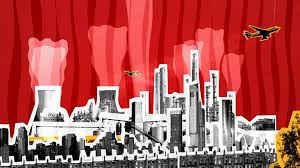
Scientists say global warming could have a catastrophic effect on the planet.
Human activities have increased carbon-dioxide emissions, driving up temperatures. Extreme weather and melting polar ice are among the possible effects.
The Earth’s average temperature is about 15C but has been much higher and lower in the past.
There are natural fluctuations in the climate but scientists say temperatures are now rising faster than at many other times
This is linked to the greenhouse effect, which describes how the Earth’s atmosphere traps some of the Sun’s energy.
Solar energy radiating back to space from the Earth’s surface is absorbed by greenhouse gases and re-emitted in all directions.
This heats both the lower atmosphere and the surface of the planet. Without this effect, the Earth would be about 30C colder and hostile to life.
Scientists believe we are adding to the natural greenhouse effect, with gases released from industry and agriculture trapping more energy and increasing the temperature.
This is known as climate change or global warming.
I – Word Understanding
Fluctuations – irregular rise and fall (of numbers/measurements)
Hostile – unfriendly
II – Have Your Say
1. China emits CO2 more than any other countries. But did you know? Japan is also one of the top CO2 emitters. Let’s look at the world’s top CO2 emitters:
a. China
b. US
c. EU
d. India
e. Russia
f. Japan
g. Germany
h. Iran
i. South Korea
j. Saudi Arabia
k. Canada
l. Indonesia
2. How will climate change affect us? What are most worried about?
a. Fresh water shortage
b. Flood, storms, heatwaves (intense rain, snow or drought)
c. Rising sea level
d. Plant and animal extinction
e. Increase in malaria, water-borne and other diseases
f. Highly acidic oceans
g. Changes in nutritional values of plants

